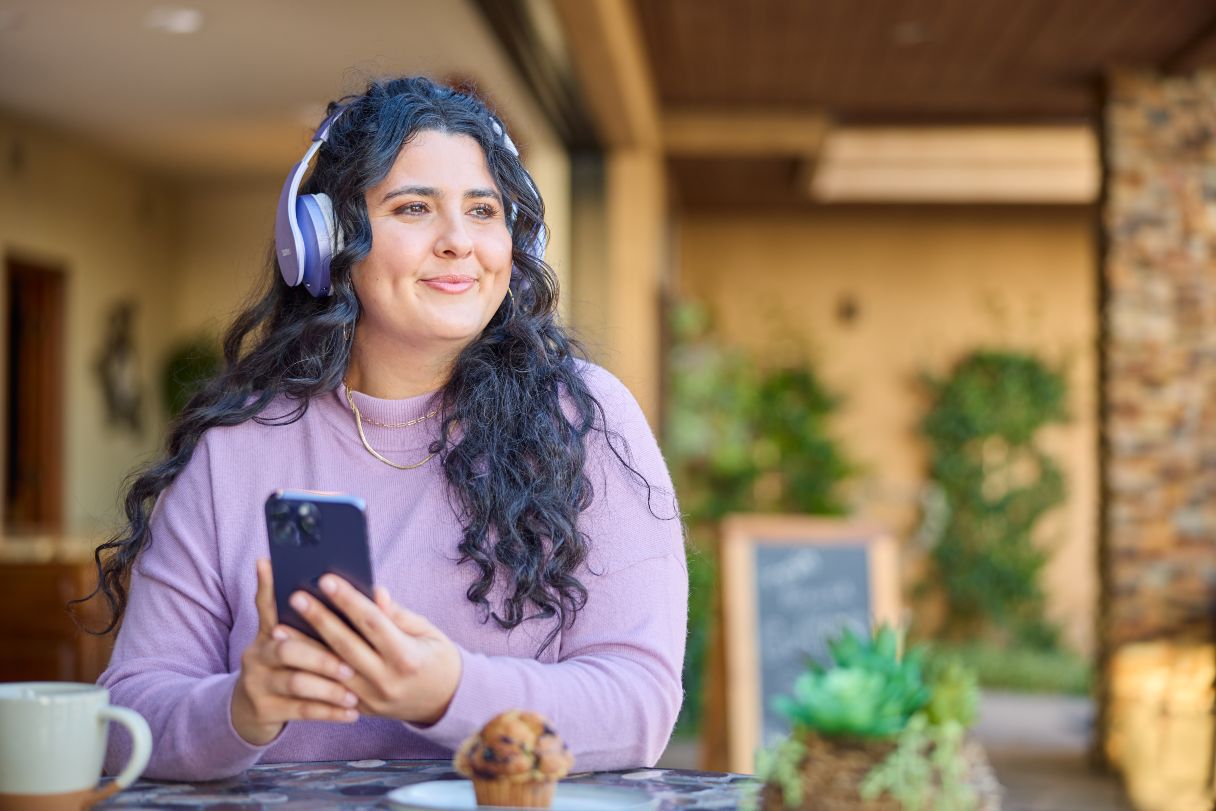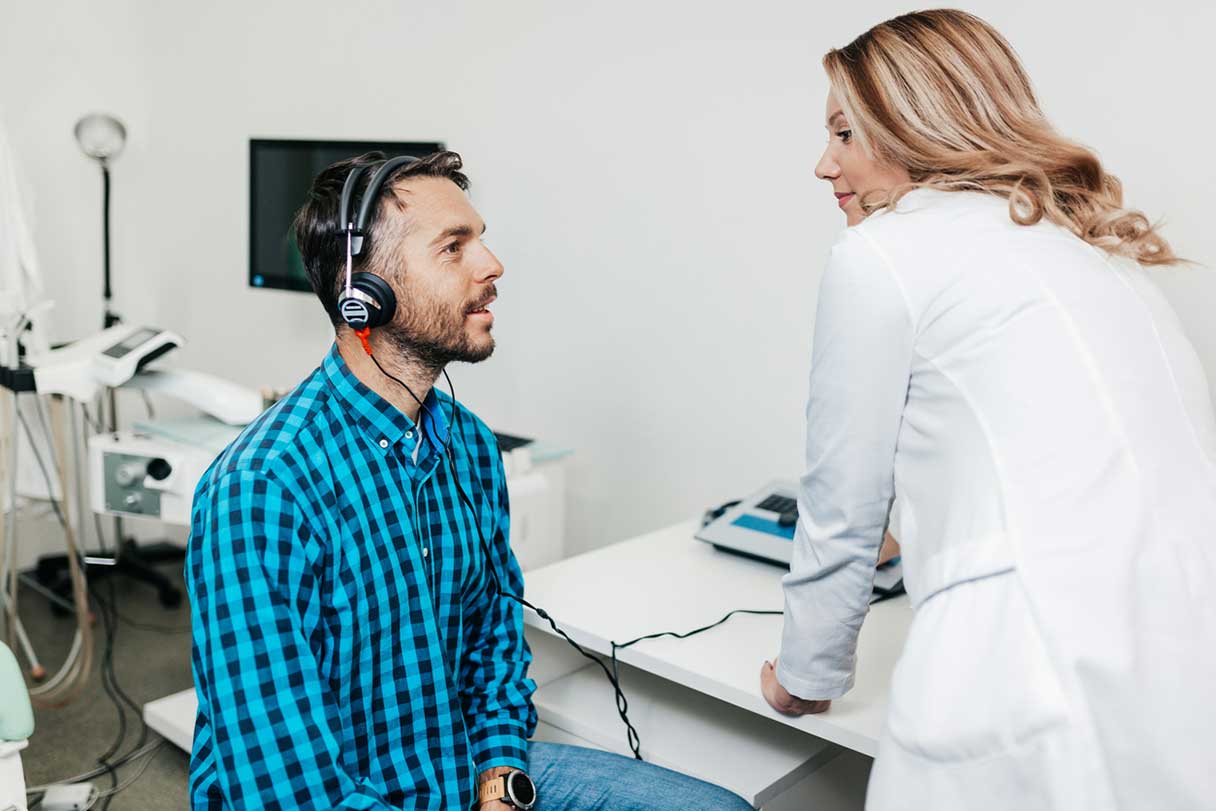As we get older, hearing checks should become a standard part of our routine health screenings — just like vision and blood pressure tests. This is because age-related hearing loss affects more than 1 in 3 adults between the ages of 65 and 74 in the United States and can negatively impact quality of life.1
A hearing screening is the first step in determining if you have hearing loss. It can be done through a primary care physician, an ear, nose and throat (ENT) doctor or an audiologist.2
In this article, we have compiled a list of frequently asked questions to help make your hearing appointment a little easier. Because, as with any medical appointment, it is important to be prepared and understand the hearing screening process.
1. Why Is It Important to Have Routine Hearing Exams?
Routine hearing exams are important because they help detect hearing loss early, often before you notice any symptoms. Catching changes in hearing early can improve communication, protect cognitive health and reduce the potential for accidents or isolation. Regular exams also ensure hearing aids (if used) are working properly and help prevent further damage from noise exposure.3 Just like eye or dental checkups, hearing tests are a key part of staying healthy, especially as we age.
2. How Often Should I Get My Hearing Checked?
Routine hearing screenings are typically recommended for adults over age 60 to get baseline hearing function, as well as rechecks every few years or sooner if you start having symptoms such as difficulty hearing conversations, ringing in the ears (tinnitus) or frequently turning up the volume on the TV.3
However, in addition to age, a variety of factors can determine when you may need to have your hearing tested. It’s a good idea to have your hearing checked if you:3
- Have been diagnosed with hearing loss (You’ll need regular check-ups.)
- Notice you are having trouble hearing, regardless of your age
- Work in an occupation surrounded by loud noise (construction, military, music, etc.)
3. How Common Is Hearing Loss?
Hearing loss is on the rise4 and is now the third most common chronic condition in the U.S.5 The following numbers highlight the prevalence of hearing loss in the nation and worldwide:
- 1 in 76 (more than 50 million)7 people in the U.S. have some degree of hearing loss
- 1 in 500 infants are born with or develop hearing loss in early childhood8
- 2.5 billion people worldwide are expected to be affected by hearing loss by 20504
- 3.6 million U.S. veterans receive hearing loss benefits9
- 5.1 million youth aged 6 to 19 have some degree of hearing loss10
- 21.5 million U.S. adults aged 71 and older have hearing loss11
- 30 million U.S. workers work in environments that could lead to noise-induced hearing loss12
4. Is Hearing Loss Hereditary?
It can be. There are many causes of hearing loss, and one of them is genetics.
Conductive hearing loss (a problem with the outer or middle ear) can develop in vitro because of malformation of the outer, middle or inner ear.13
Sensorineural hearing loss (a problem with the inner ear or auditory nerves) can be caused by a variety of congenital syndromes stemming from genetic mutations.13
5. How Do Loud Noises Impact Hearing Loss?
Sound waves from our environment are translated from vibrations to electrical signals by traveling through our outer ear, middle ear and inner ear and then onto the auditory nerve that takes the signal to the brain.14
A big part of this translation is the tiny hair cells that line the inner ear. Damage to these hair cells (which don’t grow back) can cause permanent hearing loss.14
Listening to loud music or being exposed to loud noises consistently at 85 decibels or above can cause permanent damage to the hair cells that are key in getting sound signals to the brain, resulting in noise-induced hearing loss.14
6. Can I Protect My Ears From Loud Noises?
Yes. It is important that you take measures to protect your ears if you know they will be exposed to loud noise for a long period of time.
When wearing headphones or earbuds, we tend to turn up the volume if we are in loud environments, which can damage our hearing.14
Here are some tips on how to protect your hearing in noisy environments:14
- Avoid turning up the volume too loud
- Know what kinds of noises can cause damage
- Move away from loud noises, if possible
- Wear hearing protectors (earplugs, protective earmuffs) when attending loud events or working with loud machinery
7. Can Medications Cause Hearing Problems?
Yes. Certain medications and chemicals can cause hearing loss. These medications, referred to as ototoxic medications, include chemotherapy drugs, diuretics and potent antibiotics, among others.13
8. What Other Factors Play a Role in Hearing Loss?
In addition to genetics, loud noise, aging and medications, other factors that can contribute to hearing loss include:13
- Autoimmune inner ear disease
- Benign tumors
- Ear infections
- Fluid in the middle ear
- Head injury or trauma
- Ménière’s disease (also associated with vertigo and tinnitus)
9. How Do I Know if I Have Diminished Hearing?
Hearing loss can come on suddenly or it can progress over time, which is usually the case with age-related hearing loss.13
If you are having trouble hearing in certain situations or experiencing the following symptoms, you should get your hearing checked to see if it could be diminished hearing.13
- Avoiding noisy places
- Difficulty understanding certain consonants, like B, F, K, S and T
- Experiencing tinnitus (ringing in the ears)
- Feeling exhausted after talking with people for long periods
- Feeling “fullness” in your ears
- Finding it harder to hear the voices of women and children than low-range voices
- Frequently asking people to repeat themselves
- Having balance issues
- Having dizziness
- Hearing other people’s voices sounds “mumbled”
- Needing to turn up the volume on your audio sources, like the radio or TV
- Trouble hearing conversations in crowded or loud rooms
10. Doesn’t Hearing Loss Only Affect Older People?
No. While age-related hearing loss is prevalent for many older adults, hearing loss can happen at any age, especially if you are consistently exposed to loud noise or listen to your devices at high volumes.13
11. What Types of Hearing Changes Are Common in Older Adults?
As we age, the tiny hair cells in our inner ear (which are responsible for transmitting sound impulses to our brain) can deteriorate and lose function. This can lead to hearing loss over time.15
Common changes associated with age-related hearing loss include: asking people to repeat themselves or turning up the volume on your devices louder than usual.15
Oftentimes, your friends and family might notice these changes before you do.
12. How Can Hearing Loss Impact an Older Person’s Life?
Untreated hearing loss can have a big impact on both your quality of life and your physical health.15
Some common ways untreated hearing loss can impact your health include:15
- Being more likely to experience falls
- Being unable to hear auditory warnings, such as smoke detectors or car horns, which can put your life in danger
- Facing a greater chance of developing depression
- Having an increased likelihood of developing dementia
- Withdrawing from social interactions and becoming more isolated
13. How Do Hearing Aids Work?
Hearing aids are electronic devices that use a microphone, speaker and amplifier to increase the sound and clarity of sound waves, making it easier to hear in both quiet and noisy environments.16
You have two options when purchasing hearing aids. You can buy them over-the-counter (OTC) without a prescription, or work with an audiologist or hearing specialist to find the right style and fit.16
Popular styles of hearing aids include behind-the-ear (BTE), in-the-ear (ITE) and in-the-canal (ITC).16
14. How Do I Select the Best Hearing Aid for My Needs?
Selecting the best hearing aid for your needs is a personal, individualized decision that should be made with your doctor.16
There are a couple of different types of hearing aids, each with its own pros and cons. These types include:16
- Behind-the-ear hearing aid (BTE). A hard, plastic device that sits behind your ear
- In-the-ear hearing aid (ITE). Fits inside the outer ear and is not visible to those around you
- In-the-canal hearing aids (ITC). Designed to fit and mold the shape of your ear canal
There are several factors that may go into deciding which hearing aids will work best for your lifestyle. These factors can include:16
- Cost
- Style and features
- Type and severity of hearing loss
- Whether you have hearing loss in one or both ears
- Your lifestyle
15. How Do I Clean Hearing Aids?
Hearing aids need to be cleaned regularly because they sit in your ear canal, which consists of ear wax and moisture.17
It is recommended that you clean your hearing aids daily using a wax pick, cleaning brush and soft cloth.17
Cleaning technique tips include:17
- Changing the device’s wax filters every few weeks
- Removing any debris from the openings of the device with a soft brush or dry cloth
- Soaking earmolds without speakers in warm water and allowing them to dry overnight
- Using a wire brush or wire loop to clean earmolds
- Watching for strong odors from earmolds, which could indicate an ear infection
16. How Much Do Hearing Aids Cost?
Hearing aids can be expensive, but the benefits usually outweigh the costs.
The national average cost* of digital hearing aids is around $2,114 per pair, but it can range between $1,650 and $4,155 depending on where you live.18
Additional hearing aid costs
The following are national average costs* for common hearing aid-related items and services, which may arise over time as needed.18
- A custom ear mold for BTE hearing aids costs approximately $151.
- Hearing aid adjustments to fine-tune settings cost about $76.
- Protective earplugs cost around $5 for a pack of 10 and approximately $76 for a pack of 500.
17. Do Hearing Aids Help Tinnitus?
Yes. Hearing aids can help tinnitus (ringing in the ears) by amplifying the sounds you want to hear and masking the ringing in the ears.19
It’s always a good idea to talk with your doctor about tinnitus and other ways it can be minimized to ensure your quality of life improves while wearing hearing aids.19
18. I’ve Heard Some Complaints About Hearing Aids — Are They True?
Getting hearing aids is an investment in improving your hearing. However, wearing hearing aids for the first time is an adjustment, and feeling comfortable using them takes patience and time.16
Some common adjustments when using hearing aids include:16
- Hearing a buzzing or interference sound when using a cell phone
- Increased awareness of background noise you previously didn’t notice
- Occasional feedback or whistling sounds from the hearing aid
- Your own voice may sound louder than expected (this is known as the occlusion effect)
If you are experiencing any of these uncomfortable complications with your hearing aids, talk to your doctor to see if they can make an adjustment.16
19. How Often Do I Have to Change Hearing Aid Batteries?
Hearing aid batteries can last from three to 22 days, depending on the size of the battery and whether you are using any extra technology, such as Bluetooth®.20
There is usually a low-battery beep or signal that alerts you when you need to change the batteries.20
Since hearing aid batteries can die suddenly, it’s always a good idea to carry an extra battery at all times so you can quickly change it out.20
20. Are Hearing Aid Batteries Dangerous?
Hearing aid batteries, specifically the small button-size batteries, can be dangerous if ingested or exposed to bodily fluids.21
Hearing aid batteries are dangerous because they are made of silver, lithium and mercury, which can cause severe burns to your skin and internal organs (if swallowed).21
Some tips on storing your hearing aid batteries safely include:21
- Be careful with all button batteries in your home
- Do not keep batteries next to metal objects like coins or keys
- Don’t store them next to medications, as they are often the same size
- Keep batteries sealed and away from children until you need them
- Store batteries at room temperature
21. What Is an Earmold Impression?
If you are prescribed hearing aids, you may need to get an earmold impression done. This impression, which is how your hearing aids are customized to fit your specific ear canal, may be performed by a hearing instrument specialist.2
22. What Is a Cochlear Implant? How Do I Know if I Need One?
Cochlear implants benefit people with severe to profound hearing loss or those who do not get enough support from traditional hearing aids. Adults and children can get cochlear implants.22
Cochlear implants are a more invasive type of hearing aid because they require surgery to insert a small electrode device into your inner ear (cochlea).22
This device works in tandem with an external transmitter worn on the outside of your ear. The transmitter picks up sound from a speech processor connected to a microphone and sends the signal directly to your auditory nerve.22
23. What Is Misophonia?
Misophonia is a condition where repeated sounds made by others — like chewing, swallowing or breathing — can trigger a negative emotional response, such as anger, anxiety or a desire to flee the situation.23
Some people with misophonia may also have negative responses to mechanical noises such as the humming of an air conditioner or refrigerator or noises made by pets.23
Not a lot is known about misophonia, and there is currently no treatment for the neurologic condition. It has been associated with other auditory processing disorders and syndromes that include:23
- Autism spectrum disorder
- Hyperacusis (perceiving everyday sounds as being too loud and uncomfortable)
- Migraine headaches
- Obsessive and compulsive disorders
- Schizophrenia
- Tinnitus (ringing of the ears)
- Tourette syndrome
24. What Is an Audiologist?
An audiologist is a doctor specializing in the evaluation, diagnosis, treatment and management of hearing loss, balance issues and other disorders of the ear.2
They can test your hearing to determine what level of hearing loss you have and help fit you for hearing aids.2
While an audiologist is not a physician, they do complete a doctoral degree in audiology.2
Some audiologists are generalists, covering all spectrums of age and hearing disorders, while others may specialize in pediatrics, geriatrics, tinnitus and other auditory processing issues.2
25. What Are Otolaryngologists?
An otolaryngologist is also called an ear, nose and throat doctor (ENT). They specialize in diagnosing, treating and providing surgical care for disorders of the ears, nose, throat, sinuses and thyroid.2
Visiting an otolaryngologist is a good starting point if you suspect you or a loved one has hearing loss. If further tests or hearing aids are needed, they may refer you to an audiologist.2
26. What Are Otologists and Neurotologists?
Otologists and neurotologists are both ENT doctors who specialize in ear disorders.2
Otologists specialize in performing surgeries and treating issues of the middle ear. Neurotologists focus on neurological disorders of the inner ear.2
Both doctors have similar training, so an otologist may also be considered a neurotologist and vice versa.2
Understanding and Managing Hearing Loss
If you’re over 60 or have noticed signs of hearing loss, getting a hearing test is an important step toward protecting your overall health and quality of life. When you visit your hearing care provider, don’t hesitate to ask questions; it’s the best way to understand your options and how hearing aids may benefit you.
With the right information and support, you can approach your appointment feeling confident and prepared.
Financing Ear Care With the CareCredit Credit Card
The CareCredit credit card can help you pay for hearing care, including regular hearing tests, screenings and more.** Use our Acceptance Locator to find a hearing specialist near you that accepts CareCredit. Continue to invest in your wellness journey by downloading the CareCredit Mobile App to manage your account, find a provider on the go and easily access the Well U blog for more great articles, podcasts and videos.
In addition to hearing care, you can also use your CareCredit credit card for dentistry, cosmetic, pet care, vision, health systems, dermatology, pharmacy purchases, spa treatments and so much more within the CareCredit network. How will you invest in your health and wellness next?
Author Bio
Amy Isler, M.S.N., R.N., has more than a decade of nursing expertise. She combines her nursing experience and journalism background to create engaging and educational healthcare content for leading brands and publications, including GoodRx, Verywell Health, Vision Center and more. Her mission in writing is to provide positive, accurate and informative articles for consumers.








